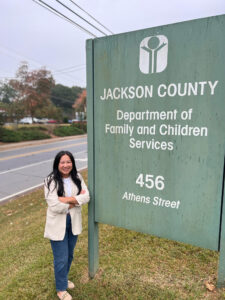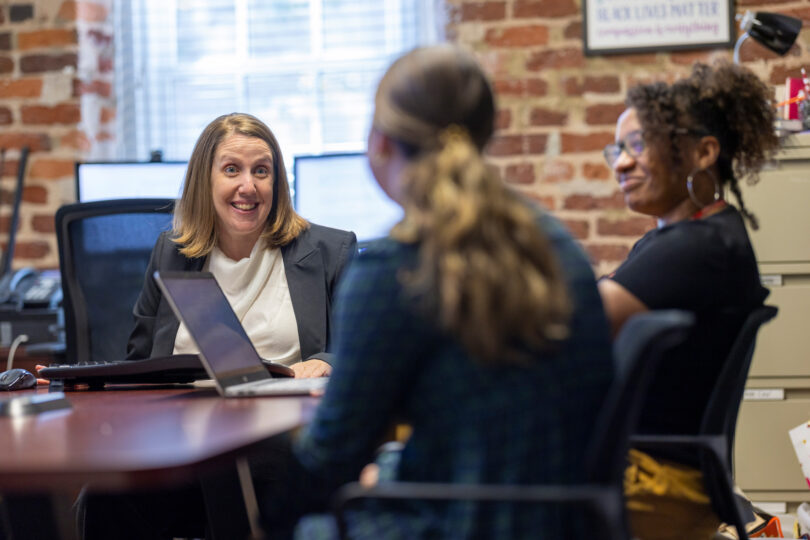From July 1, 2019, to June 30, 2020, 15,834 families benefited from assistance from the state of Georgia’s Division of Family and Children Services (DFCS).
The future and safety of these vulnerable Georgians—both children and adults—often depend upon the service workers assigned to their cases. While expertise is at a premium, it is no longer a requirement for management at DFCS to have graduate degrees or advanced education. However, with dozens of cases rolling in per month, it can seem impossible for DFCS employees to even consider returning to school for an advanced degree in social work.
“I have a deep love for child welfare and always wanted to get my Master of Social Work,” says Kenya Wooden MSW ’21, now a Newton County director. “Finding the time was difficult. Having self-doubt in my ability to manage a demanding job, family, and school was unnerving.”
Thanks to a four-year, $650,000 grant from the National Child Welfare Workforce Institute, UGA’s School of Social Work helped Wooden and five other DFCS leaders in the state earn advanced degrees. Nine more will graduate in the next two years.
“It was a huge blessing to focus on my own development,” she says.
Working closely with Georgia State University and Albany State University, the School of Social Work is changing workforce development in Georgia’s DFCS. This four-year grant has provided department leaders with the funding to further their education, share their knowledge with those they supervise, and better care for Georgia families.
From the Classroom to the Cases
“I coach and mentor supervisors and case managers,” says Jane Yang MSW ’21, permanency field program specialist. “Being able to relate what I learned at UGA to child welfare has helped my supervisors and case managers in their engagement with families.” Yang serves in 12 counties as a policy expert, consulting on difficult cases, such as those involving child abuse or barriers to foster care.
The degree itself has far-reaching impacts for DFCS offices. Students are given the space to level up their on-the-job knowledge and training by enhancing their ability to establish relationships with people, identify and assess needs and services, and navigate hard conversations.
Wooden gained an understanding of the kinds of experiences that shape the families served by social workers. “The families we work with have all experienced trauma, and the program broadened my understanding so I can better serve families. It gave me a fresh outlook.”

Jane Yang, is a permanency field program specialist with the Jackson County Department of Child and Family Services.
As part of the grant, students completed a cultural competency assessment. For instance, if a DFCS employee is working with a military family or within the immigrant community, this opportunity allowed them to tune into potential subconscious biases and gain a greater understanding of what unique situations and lived experiences others have had. “It was an opportunity for students to do some self-reflection and exploration on how their identities might impact their work in multiple cultural contexts,” explains Allison Dunnigan, assistant professor in the School of Social Work.
For Tasha Head BSW ’09, MSW ’21, social services supervisor for the family preservation unit and foster care in Barrow County, the grant and opportunity to go back to school allowed her to consider the “macro” perspective of social work by looking at the “micro” perspective from different lenses. Head explains that students were able to “look at the bigger picture and offer better resources for reunification and case closure.”
Wooden even started a book club within her office, using the books she read in class. “My staff was able to grow alongside me.”
Each student in the master’s program has to complete an internship, but for grant participants in particular, this time provided an opportunity to address an issue they’ve noticed for years but didn’t have the time or resources to devote to solving. Head used her internship time to work closely with her department’s providers such as counselors and school partners, ensuring everyone was “on the same page.”
“I believe we are seeing more success and movement with our cases,” she says. “This also makes sure that services involved with families are working and effective.”
Pre-pandemic, another student had the idea of looking at the issue of hoteling within the industry, where foster kids are placed in hotels with DFCS staff, rather than homes, due to a lack of available families. Although the project shifted as a result of the pandemic, they were able to address an equally important need: designing protocols for virtual visits.
Building a Nationwide Network
Dunnigan joined UGA’s faculty after spending five years serving as a court representative for foster care cases in the St. Louis family court system.
In addition to teaching, Dunnigan is the director for UGA’s Title IV-E program. It’s a stipend program where students’ tuition and fees for the Master of Social Work degree are covered in exchange for working for DFCS for the same length of time after graduation. It’s aimed at strengthening the workforce that supports the welfare of children and their families. It’s through this program that Dunnigan learned of the National Child Welfare Workforce Institute’s grant. Usually, the institute helps universities build or expand on their existing IV-E programs, but since UGA already had a robust program, the funding allowed Dunnigan and her colleagues at Georgia State and Albany State to become one of the institute’s seven Workforce Excellence sites by expanding the Title IV-E programs at each institution.
As for DFCS, the agency gained better-prepared employees at the leadership level and received an in-depth assessment at the start of the grant. After interviews, focus groups, and a survey that received an 80% response rate, strengths and weaknesses were revealed, such as worker safety, workload, peer and supervisor relationships, growth opportunities, and retention. Dunnigan continues to meet monthly with her partners at DFCS to help the agency address issues the assessment highlighted.
Several institutions from both inside and outside of Georgia have even approached Dunnigan about learning from her and her colleagues’ Title IV-E programs.
“It is my goal for us to have MSWs in every DFCS county office,” says Dunnigan. “Every office that has another MSW as a resource, as someone in a supervisory position, can address issues with their knowledge—then all of those families served by that office are impacted. For students at the state office, they are applying their knowledge to the training and quality assurance efforts that impact the entire state. As we continue to grow and expand, we’re going to see a more well-informed, more skilled workforce that’s better able to respond to the needs of the families it serves.”





